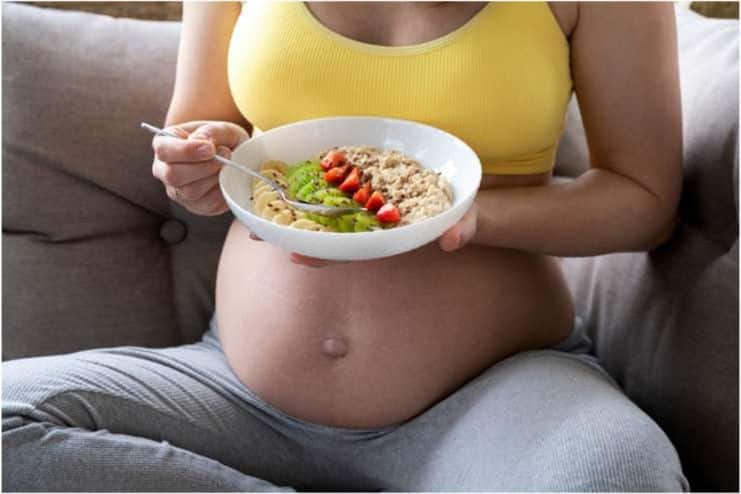Affiliate Disclaimer
Some links in this article are affiliate links. We may earn a small commission if you make a purchase through these links, at no extra cost to you. We only recommend products we find useful to our readersEating a healthy diet is crucial for both the mother’s health and the development of the fetus because pregnancy is a time of profound physiological change. It is impossible to overestimate the importance of eating a healthy, well-balanced diet during pregnancy because it immediately affects the expectant mother’s health and lays the groundwork for the developing baby’s well-being. The nutrients a pregnant woman eats have a significant impact on her health. A woman’s body experiences incredible transformations to support and care for the growing fetus, necessitating a greater consumption of vital nutrients. Nutrition is essential for meeting the physiological needs of pregnancy.
In this article on the critical role that nutrition plays throughout pregnancy, we focus on the nutrients necessary for the health of both the mother and the fetus, illuminating the significant influence that dietary decisions have on the course of pregnancy.
Macronutrients and Micronutrients
Macronutrients and micronutrients must be carefully considered to provide a balanced and nutrient-dense diet during pregnancy. These two groups of nutrients have specific functions essential to the fetus’s health and development. Macronutrients, such as fat, protein, and carbohydrates, are the nutrients we require in greater amounts to provide energy. Most micronutrients are vitamins and minerals, which are similarly significant but only ingested in trace amounts.
A balanced diet is built on macronutrients, which include lipids, proteins, and carbs. The primary energy source is carbohydrates, which provide the fuel needed to meet the higher metabolic needs of pregnancy. They are essential for keeping the mother’s and the developing fetus’s energy levels at their ideal levels and preventing weariness.
Amino acid-based proteins are necessary to rapidly develop the baby’s tissues and cells. Protein becomes increasingly essential throughout pregnancy to sustain the growth of the fetus, amniotic fluid, and placenta. Consuming enough protein is crucial to avoiding issues like preterm birth and low birth weight.
Contrary to popular belief, fats are essential for developing the unborn brain and the nervous system. In particular, omega-3 fatty acids support the development of cognition and eyesight. Furthermore, fats help absorb fat-soluble vitamins by acting as a concentrated energy source.
Micronutrients, which include vitamins and minerals, are equally essential to pregnancy. For example, iron is critical to maintaining the fetus’s ideal oxygen supply and preventing maternal anemia. Calcium is necessary to grow a baby’s bones and teeth, and the B vitamin folate can significantly help prevent neural tube abnormalities.
Every nutrient has a distinct role in promoting the fetus’s growth and well-being. For instance, vitamin D facilitates bone synthesis by assisting in calcium absorption. The fact that zinc aids in cellular development and DNA synthesis highlights the complex interactions between these micronutrients in maintaining a healthy pregnancy.
In this investigation of macronutrients and micronutrients, we unravel the complex components required for a healthy pregnancy, highlighting the significance of an informed and well-balanced nutritional strategy for expectant moms.
Recommended Foods and Portions

Pregnancy-optimal nutrition is attained with a diversified, well-balanced diet that ensures all necessary nutrients are consumed. Expectant moms can benefit from a thorough list of foods rich in essential nutrients, as it can advise them and support the health and development of their fetus.
Foods High in Folate:
- Leafy Greens (kale, spinach)
- Legumes (chickpeas, lentils)
- whole grains and fortified cereals
Iron-Enriched Choices:
- Fish, particularly oily varieties like salmon; Lean meats, such as chicken and turkey
- Lentils with beans
- Grain enriched with iron
Dairy products:
- Milk, yogurt, and cheese are very rich sources of calcium.
- Enhanced plant-based milk (soy, almond)
- Leafy vegetables (bok choy, collard greens)
Protein-Rich Foods:
- Poultry and Lean Meats Eggs
- Dairy goods
- Beans with Legume
Omega-3 fatty acids:
- Mackerel and salmon fish are high in omega-3 fatty acids
- Flaxseed and chia seeds
- Walnuts
Foods High in Vitamin D:
- Fatty Fish
- Dairy products with added nutrients
- Yolks of eggs
Advice on Portion Sizes: Maintaining a healthy weight throughout pregnancy is critical, and portion control is one way to do this. Pregnancy increases nutritional needs, yet watching what you consume is essential. The ideal serving sizes depend on several personal factors, such as exercise level and pre-pregnancy weight. Small, regular meals throughout the day often help control energy levels and discourage overeating.
Dietary variety is essential because it guarantees a wide range of vital nutrients. Consuming various fruits, vegetables, whole grains, lean proteins, dairy products, and dairy substitutes achieves a well-rounded nutritional profile. This variety helps avoid food boredom while also satisfying the unique demands of the mother and the developing child.
Pregnant women can lay the groundwork for a healthy and satisfying pregnancy and establish the ideal fetal growth and development environment by including these suggested foods and being mindful of portion sizes and dietary variety. It is crucial to seek individualized counsel from a healthcare professional to meet specific needs and guarantee a healthy pregnancy journey.
Managing Pregnancy Cravings and Aversions

Due to the intense appetites and aversions that frequently accompany pregnancy, pregnant moms face particular difficulties in sticking to a healthy diet. To ensure optimal fetal development and the well-being of the mother, it is essential to comprehend and control these cravings.
Common Pregnancy Cravings and Healthful Substitutes: Sweet and savory foods might be cravings throughout pregnancy. Examine healthier options before settling for less nourishing options. When cravings strike, try naturally sweetened fruits or yogurt topped with granola for a filling substitute. Choose whole-grain crackers with hummus or a handful of nuts for a crunchy, nutrient-rich snack to satisfy your salty cravings.
- Techniques for Handling Food Aversions: On the other hand, food aversions might cause people to avoid particular foods, affecting their general nutrition. Take into account the following tactics to deal with this:
- Try Different Cooking Methods: You can change how food is cooked to change its texture and flavor. Grilling, roasting, or steaming previously unpleasant foods may become more delicious.
- Examine Temperature Variations: Food aversions can occasionally be influenced by temperature. It could be more accessible to tolerate certain foods if you try them at different degrees, like room temperature or cold.
- Select Substitutes High in Nutrients: Look for nutrient-dense substitutes if your aversions are focused on particular food groups. If dairy doesn’t appeal to you, try plant-based calcium sources like leafy greens or fortified plant milks.
Handling desires and aversions throughout pregnancy is an individual process. While giving in to desires to some extent is essential, choosing healthier options guarantees that the mother’s and the developing baby’s nutritional needs are addressed. During this transition period, seeking guidance from healthcare professionals or nutrition experts can yield customized recommendations, promoting a well-rounded strategy accommodating personal dietary needs and preferences.
Special Considerations and Dietary Restrictions

Particular nutritional needs arise during pregnancy, and for some pregnant moms, following specific dietary guidelines or limitations is an essential part of their way of life. It is necessary to comprehend these factors to guarantee a balanced diet during this transition time. High-fiber vegan diets, including whole grains, fruits, vegetables, and low-saturated fat, may help prevent gestational diabetes and excessive weight gain. A vegan diet may lower your risk of requiring a C-section if you have gestational diabetes. It might also lessen your requirement for insulin.
Vegan or Vegetarian Diets: Expectant mothers who follow a vegan or vegetarian diet can ensure a healthy pregnancy by ensuring they receive all the nutrients they need from plant-based sources. Fortified plant-based goods, whole grains, legumes, and various fruits and vegetables can supply essential vitamins and minerals, including vitamin B12, calcium, and iron. Potential vitamin shortages can be filled by supplementing as needed under a doctor’s supervision.
Foods to Avoid or Limit for Safety: Several foods should be avoided or limited during pregnancy because they may be dangerous for the unborn child and the mother. Among them are:
- Raw or Undercooked Seafood and Eggs: To lower your chance of contracting a foodborne illness, it is best to avoid raw or undercooked seafood and eggs.
- Unpasteurized Dairy Products: Dairy products without pasteurization could contain dangerous bacteria. Choose pasteurized substitutes to reduce the possibility of infection.
- Fish with High Mercury Content: A few types of fish, including king mackerel, swordfish, shark, and tilefish, have a high mercury content. Restricting consumption is crucial to avoid injury to the developing baby’s neurological system.
A successful pregnancy requires navigating unique nutritional issues and following safety protocols. Expectant moms should speak with medical professionals to create dietary programs that satisfy specific tastes and nutritional requirements while prioritizing the safety and well-being of the mother and the developing child.
Hydration and Supplements

It is imperative that women drink enough water to support the numerous physiological changes that occur during pregnancy and provide the best possible health for the developing baby and the expecting mother. In addition to assisting with nutrient transportation and helping to maintain amniotic fluid levels, drinking enough water also helps to relieve typical discomforts like constipation and edema. Pregnancy-related healthcare practitioners usually advise drinking more water daily, stressing the significance of staying hydrated to support general health.
Maintaining adequate hydration is essential to a healthy pregnancy. Expectant mothers are advised to drink eight to twelve cups (64 to 96 ounces) of water daily. Apart from satisfying hydration needs, water fulfills other vital roles during pregnancy. It is essential for generating amniotic fluid, which provides a nurturing environment for the growing fetus.
Water also plays a vital role in digestion and facilitating the effective absorption of nutrients. Furthermore, it aids the removal of waste items from the body and helps the circulatory system function, allowing the body to distribute vital nutrients throughout. Adopting a balanced water consumption pattern is an easy yet effective strategy for pregnant moms to support their growing babies’ health and their own during pregnancy.
Prenatal vitamins are essential for supplying the increased nutritional needs of pregnancy and enough hydration. Medical professionals frequently recommend specific prenatal vitamins that include crucial nutrients, such as folic acid, iron, calcium, and omega-3 fatty acids. These supplements protect against deficits that might adversely affect the mother’s health and the fetus’s development by filling in possible nutritional gaps. To guarantee thorough and ideal support during the pregnancy journey, expectant moms must follow the specific supplement recommendations given by their healthcare providers.
Conclusion
In conclusion, the health of moms and their unborn children must maintain a nutritious and well-balanced diet throughout pregnancy. A healthy body promotes the best possible fetal development, lowers the chance of problems, and improves the mother’s health. Making nutrition a priority guarantees the groundwork for a healthier future and serves as a lighthouse for a successful pregnancy. Expectant moms are urged to welcome the life-changing experience by educating themselves about nutrition, seeking advice from medical professionals, and savoring the fulfilling experience of giving their priceless children the best start in life.
References
- https://www.ncbi.nlm.nih.gov/pmc/articles/PMC6413112
- https://www.bhf.org.uk/informationsupport/heart-matters-magazine/nutrition/ask-the-expert/macronutrients
- https://www.betterhealth.vic.gov.au/health/healthyliving/pregnancy-and-diet
- https://www.mayoclinic.org/healthy-lifestyle/pregnancy-week-by-week/in-depth/pregnancy-nutrition/art-20045082
- https://www.acog.org/womens-health/faqs/nutrition-during-pregnancy
- https://health.gov/myhealthfinder/pregnancy/nutrition-and-physical-activity/eat-healthy-during-pregnancy-quick-tips
- https://www.pampers.com/en-us/pregnancy/prenatal-health-and-wellness/article/pregnancy-cravings
- https://www.pregnancybirthbaby.org.au/food-cravings-during-pregnancy
- https://www.whattoexpect.com/pregnancy/symptoms-and-solutions/cravings-and-aversions.aspx
- https://www.verywellfamily.com/pregnancy-cravings-5069392
- https://www.ncbi.nlm.nih.gov/pmc/articles/PMC6470702/
- https://www.nutrition.org.uk/life-stages/pregnancy/healthy-eating-during-pregnancy/vegetarian-and-vegan-diets-during-pregnancy/
- https://www.webmd.com/baby/is-it-safe-to-eat-a-vegan-diet-while-pregnant
- https://www.nhs.uk/pregnancy/keeping-well/vegetarian-or-vegan-and-pregnant
- https://www.dignityhealth.org/articles/dehydration-during-pregnancy-what-expecting-mothers-should-know
In this Article




















